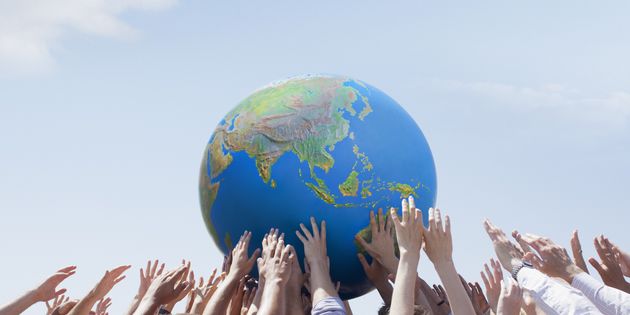In light of the stigmatisation of large groups of newcomers in our societies, it is important to stress the common humanity of all human beings, and of the equal dignity we all posses in the eyes of God.

We live in a time of great change: the ever-exalarating process of globalization leads to the gradual break-up of traditional nation states. We see that in political movements, such as the creating of the ever-more powerful European Union. We also see it in the growing power of multinational businesses, and of global economic agreements such as the currently much-discussed TTIP.
A more concrete, and very pressing, face to the changes to which globalization leads is the current refugee crisis engulfing Europe: while refugee-migrations have always been part of human existence, the scale of the current refugee crisis is clearly fuelled by modern advancements in communication and transportation.
While many welcome the process of globalization, seeing it as a blessing to humanity, providing the long-searched for means to establish a truly universal brother- and sisterhood, others have a very different reaction. Throughout Europe – and, indeed, throughout the world – we witness a contra-movement, one of exlcusion, nationalism and (religious) fundamentalism. That extends from the way the current refugees from Syria are perceived to the approach taken towards the European Union’s goal of ‘ever closer union’.
While it is easy to sneer at what many describe as uneducated gut-reactions, it is important not to ignore the strength and the seriousness of the emotions that are stirred by globalization. Many people perceive it to be a major, existential crisis – they feel that their ethnicity, their culture, their language, is threatened, be it by global trade partners that influence our lives ever deeper, or by refugees, closer to home. People react very strongly, even violently to that, and assert their own uniqueness and particularity vis-à-vis these many ‘others’.
How to deal with these emotions? Denying them is useless – they are there, and denying or ridiculing them will perhaps only make them stronger. The American philosopher Martha Nussbaum, in her book Political Emotions, recognizes this. She argues that instead, these emotions should be dealt with differently. She argues that too often, the advocates of universal brotherhood, equality and justice are exactly not that – advocates.
They refuse to get their hands dirty by creating positive, inspiring, value-directed focus-points for these emotions; concrete art-forms, such as poetry, statutes, architecture or films, that are able to rally people around a common purpose. Yet this, she says, is the work to be done, if we do not want these emotions chanelled in ways that prop up exclusivist nationalist narratives.
It goes too far to expound her argument in more detail, but it is important to stress that here lies a challenge for Christians, especially in Europe. This challenge is all the more pressing in light of the fact that conservative Christians sometimes support nationalistic outbursts. In the United States, for example, many evangelical Christians are very supportive of the idea of America’s ‘manifest destiny’ – the idea that that nation is ‘set apart’ in some kind of special way. And in Russia, the conservative Orthodox Church is also deeply nationalistic, currently involved in propping up an ever more dictatorial regime.
The alternative to this embroilment in nationalism is not detachment, or staying aloof of worldly affairs. While the kingdoms of the world are indeed very different from the Kingdom of God (Mark 12:17), there is nevertheless room and even responsibility for Christians to work for the common good. Currently, a key part of that work lies in the recreation of our common social imaginary – we have to find new focal points to positively guide public emotions.
In light of the stigmatisation of large groups of newcomers in our societies, for example, it is especially important to stress the common humanity of all human beings, and of the equal dignity we all posses in the eyes of God. If we can find meaningful symbols that are able to capture and convey that message, we are doing our Christian duty in today’s world.
Steven van den Heuvel (Ph.D.) is Postdoctoral Researcher at the Evangelical Theological Faculty, Leuven, Belgium and member of the Steering Committee for the Institute of Leadership and Ethics.
This blog is part of a blog series on Leadership & Social Ethics, published by the Institute of Leadership and Ethics. For more information, please visit their website.

Las opiniones vertidas por nuestros colaboradores se realizan a nivel personal, pudiendo coincidir o no con la postura de la dirección de Protestante Digital.
Si quieres comentar o